




JOIN NOW
our Italian Cooking
Newsletter






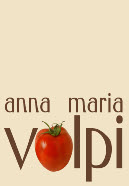





Publication or use of pictures, recipes, articles, or any other material form my Web site, on or off-line without written permission from the author is prohibited. If you would like to use my articles on your Web site or in your publication, contact me for details. Avoid infringing copyright law and its consequences: read the article 7 Online Copyright Myths by Judith Kallos
Copyright © 2003 - 2011 Anna Maria Volpi - All Rights reserved.
Anna Maria's Open Kitchen Site Map







Some More Hot Topics You'd Like to See adv.





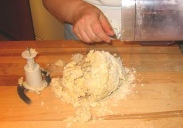

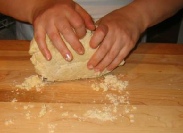
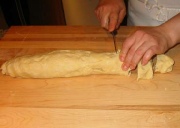

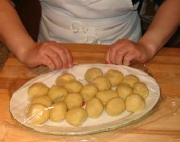
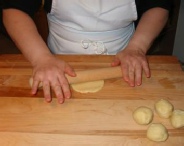
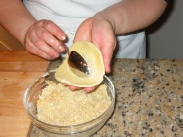


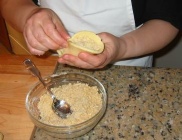
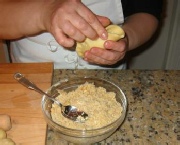

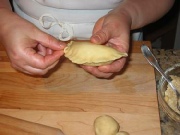



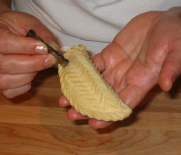
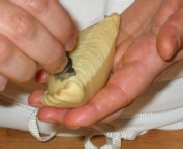
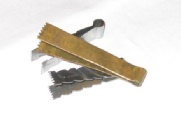
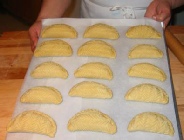
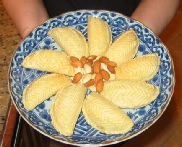
Transfer the dough to a work surface. The dough at this point will be dry and inconsistent.
Knead the dough for few minutes....
....until a smoother dough is obtained.
Shape the dough into a long stick about 2”x2” (5x5 cm) wide. Cut the dough in about 1 inch (2.5 cm) pieces.
Shape the pieces in small balls approximately the size of a golf ball.
Place the balls on a plate. Cover with plastic wrap and place in the refrigerator for about 2 hours.
Preheat oven 360F (190 C). To avoid heating the dough remove the balls from the refrigerator a few at a time. With a rolling pin, flatten the dough in a disk about 4 inch (10 cm) diameter.
Position the dough in the palm of your hand, slightly folded, and place 2 tablespoons of filling on it.
Start closing the pastry in a half moon shape. Pinch the bottom of the round to start folding it.
Press the filling and clean the edges.
Pinch the pastry all around the edge firmly....
....until the half moon shape is fully closed.
Tap lightly the bottom on the work surface to make it flat.
To decorate the edges pinch the dough....
...then twist, one pinch to another, with the thumb and index finger....
Place the pastries under a plastic wrap to keep them moist.
If you have the special tweezers to be used for the decoration....
...starting from one edge, pinch the surface of the pastry with the tweezers...
...in a fish scale design, until one side of the pastry is fully covered.
Place the pastries on cookie sheets and bake for about about 30 minutes or until the surface is very light gold.
Serve the pastries when they are lookwarm.
If the surface of the pastries is not decorated, serve the shekerbura covered by powdered sugar.
makes about 24
for the filling:
7 oz (200 gr) blanched almonds, coarsely ground
5 oz (150 gr) sugar
1/2 teaspoon cardamon powder
1/8 cup (30 cc) water
for the dough:
9 oz (250 gr) butter, diced
18 oz (500 gr) all purpose flour
1 egg
1/2 cup (120 cc) cold water
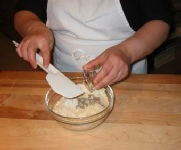
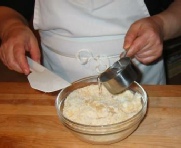

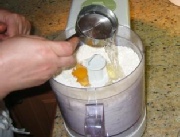
Place the almonds in a small bowl. Combine sugar and cardamon.
Add the water and mix thoroughly to moisten the filling. Cover and set aside.
Put in a food processor butter, flour and egg.
Add the cold water and run the blade until thoroughly combined.
It is an Azerbaijani tradition for girls to learn cooking in their families. Born and raised in Baku, as a young girl Bahar watched and learned as her mother prepared meals.
Guest Cook from AZERBAIJAN

Azerbaijan is a diverse country with plains, mountains (Caucasus Mountains), and coastline (Caspian Sea), and the climate is temperate. The cuisine is very rich and colorful, but traditional cooking has changed considerably over the past century due to external political influences.
During the soviet period many changes were made to the society at large. Azerbaijani cuisine went through a considerable transformation when a number of Russian dishes were imported into the local cooking.
Russians introduced many new preparations such as stolichniy (potato salad), pirozhki (stuffed dough), or blinchiki (pancakes stuffed with meat or cheese). All these dishes are now accepted and considered as local.
Azerbaijan is also subject today, like all the rest of the world, to a wave of imported fast foods that imitate European and American styles. Despite these trends you can still find in Azerbaijan many dishes that belong to the past traditions.
Shekerbura is one of the traditional pastries usually baked for Novruz, one of the most important holidays in Azerbaijan. It is not a religious holiday, but actually is the celebration of the coming of spring, and the renewal of nature. Novruz was celebrated in pre-Islamic times and according to tradition originates in Babylon.
Shekerbura consists of nuts and sugar wrapped in pastry dough. The outer surface is then intricately decorated using a special tool. The recipe for Shekerbura traditionally passes from generation to generation, and each family adds its own special touch.
Considering the surprising simplicity of the ingredients used in the recipe, the final result is just spectacular.
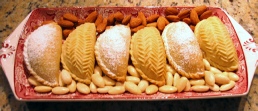
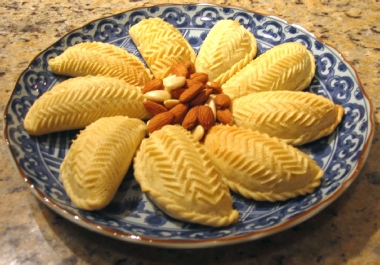
Click on the picture to see a larger image

Later Bahar was busy with her studies in college and did not have very much time
to devote to cooking until she finished university. After she got married she started
cooking for her family and her skills were heightened by her passion for Azerbaijani
traditional cuisine.
She moved to Los Angeles when her husband was invited to work as a university researcher.
Although she no longer lives in Azerbaijan, she did not forget her cultural background,
and she still cooks traditional Azerbaijani dishes.















































